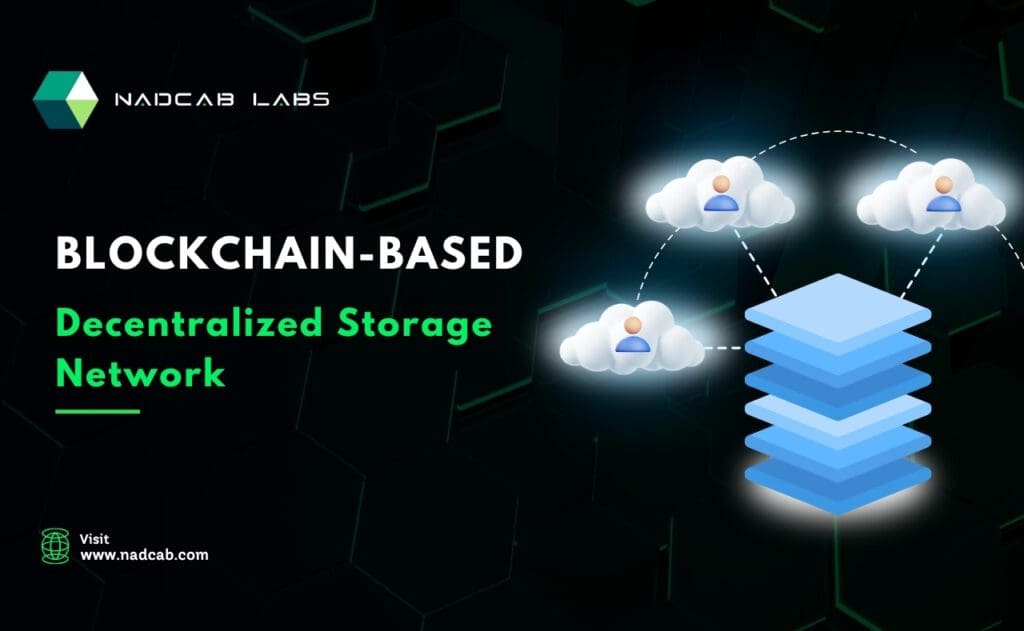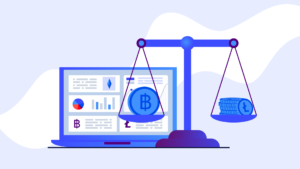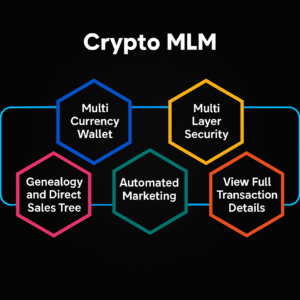
Our digital identities are currently typically kept in centralized systems. These systems are simple to use, but because users do not have complete control over their data, it is more dangerous for loss, privacy violations, and cyberattacks.
However, the emergence of Web3 Development is altering how we communicate online, and Blockchain Technology is a major factor in this change. Applications powered by Blockchain function independently of others, eliminating the need for dependable third parties and promoting a decentralized Internet where users have greater control over their personal information and online activities. Furthermore, rather than depending on a single centralized server, users can store and retrieve their data throughout a distributed network with Decentralized Storage alternatives.
Understanding Decentralized Storage Networks
Decentralized Storage Networks distribute data across multiple nodes, often spread globally, rather than storing it in a single, centralized location. These networks use blockchain technology and P2P (peer-to-peer) protocols to ensure data integrity, security and accessibility.. Each node in the network contributes storage space, and in return, earns rewards, typically in the form of cryptocurrency.
How Does Decentralized Storage Work?
Decentralized storage works by spreading data across many different computers or nodes in a peer-to-peer (P2P) network, such as Bit Torrent or the Inter Planetary File System (IPFS).
When you upload data to a Decentalized Storage system, it’s broken down into small pieces and distributed across multiple nodes in the network. When you need to retrieve your data, the network gathers these pieces from the various nodes and puts them back together for you to download.
Moreover, the data stored in a decentralized system is secure because it’s automatically encrypted using cryptographic hashing. This means the nodes storing the data can’t see or change it. Only users with the right private keys can access their data, ensuring that unauthorized people can’t get to it.
Types of DSN
-
Peer-to-Peer Networks
Directly share files or make calls without central servers, like Bit Torrent for downloads and Skype for calls.
-
Blockchain and Cryptocurrencies
Public Blockchains- Open to everyone, like Bitcoin and Ethereum.
Private Blockchains- Restricted access for specific groups, like Hyper ledger Fabric.
-
Decentralized Finance (DeFi)
Exchanges- Trade cryptocurrencies directly with others, like Uniswap.
Lending/Borrowing- Borrow or lend without banks, using platforms like Aave.
-
Decentralized Autonomous Organizations (DAOs)
Organizations run by code, where members vote on decisions, like MakerDAO.
-
Decentralized Apps and Identity
dApps- Apps running on a blockchain, like the game Crypto Kitties.
Decentralized Identity- Control your own digital ID, with projects like Sovr in.
-
Decentralized Storage and Marketplaces
File Storage- Spread files across many computers for security, like IPFS.
Marketplaces- Buy and sell directly without middlemen, using platforms like Open Bazaar.
Centralized Vs Decentralized Storage
-
Centralized Storage
Centralized storage refers to storing data in a single, central location, often managed by a single organization or entity. This is the traditional model used by most businesses and cloud storage providers.
-
Decentralized Storage
Decentralized storage distributes data across multiple nodes or locations, often leveraging peer-to-peer networks and blockchain technology. Examples include IPFS (Inter Planetary File System) and blockchain-based storage solutions like File coin and Storj.
Challenges In Decentralized Storage Network
-
Security
Ensuring strong encryption to protect data. Trusting nodes not to tamper with or steal data.
-
Reliability
Maintaining network uptime and data availability. Ensuring sufficient data replication to prevent loss.
-
Performance
Speeding up data retrieval, which can be slower than centralized systems. Reducing network latency.
-
Economic Incentives
Creating fair compensation models for storage providers. Managing the volatility of cryptocurrency-based payments.
-
Legal Issues
Complying with varying data storage laws across countries. Determining responsibility for illegal content.
-
Usability
Making the network user-friendly and easy to integrate. Building trust and awareness among users.
-
Technical Problems
Ensuring interoperability with other systems. Developing secure and efficient consensus mechanisms.
-
Maintenance
Coordinating decentralized upgrades and improvements. Rapidly addressing security vulnerabilities and bugs.
Future Developments and Innovations
-
Smarter Consensus Mechanisms
Researchers are creating new ways for systems to agree on data integrity that are more efficient and environmentally friendly, such as Proof of Stake (PoS) and Proof of Burn (PoB). These innovations aim to secure data without wasting resources.
-
AI Integration
Artificial intelligence is being woven into Decentralized Storage networks, making data storage and retrieval smarter and faster. They improve security and privacy by giving consumers more control over their personal information.
-
Ongoing Blockchain Innovations
New blockchain technologies with improved scalability, quicker transaction speeds, and more security are always being created. The usage of distributed storage is now more solidly supported by these developments.
-
Rise of Decentralized Identity
As privacy concerns increase, more individuals and organizations are looking to Decentralized Identifiers (DIDs) and other decentralized identification solutions. They improve security and privacy by giving consumers more control over their personal information.
How does Nadcab Labs use Decentralized Storage Networks to Boost Client Profitability?
Uses Decentralized Storage Solutions to improve its Blockchain Services. By distributing data across multiple nodes, they make it difficult for hackers to secure information. This arrangement also allows businesses to grow without expensive infrastructure upgrades. It also reduces costs by reducing the need for central data centers. Overall, this approach helps Nadcab Labs customers become more efficient and profitable by providing a combination of security, scalability and savings that benefit multiple industries.
Author Profile
Vartika Krishnani works at Nadcab Labs, helping businesses thrive online through effective SEO strategies that ensure they stand out on the internet. At Nadcab Labs, our mission is to drive business growth using cutting-edge technologies like blockchain and smart digital marketing.







